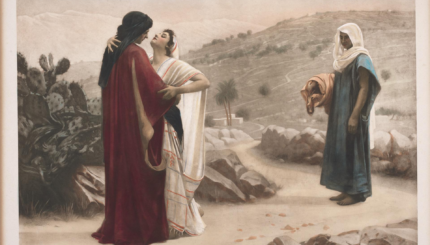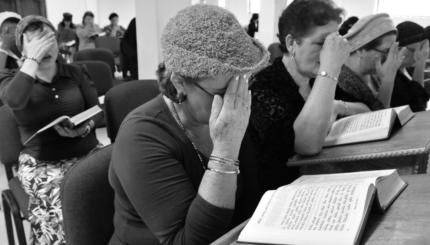Commentary on Parashat Beha'alotcha, Numbers 8:1 - 12:16
After the sanctification of the Dwelling Place for God, God spoke to Moses saying, “Speak to Aaron and have him light the menorah so that the seven lights shall cast light.” And Aaron did so.
Then God said to Moses, “Take the Levites and purify them with waters that clear of sin, and make animal and flour offerings to God. Then you shall assemble the whole community and have the Levites come before the Tent of Appointed Meeting.” And it was done.
God spoke to Moses in the wilderness of Sinai, in the second year after their exodus from Egypt. “Let the sons of Israel make Pesach on the fourteenth day of this month, between the two evenings. Even if a man is unclean, the Pesach offering with matzah and bitter herbs must still be made. For one who neglects the Pesach offering to God shall be uprooted from among his people.” And a Pesach offering was made.
On the day that the Dwelling Place was erected, a cloud covered. In the evening, above the Dwelling Place there was a fire-like glow. Only when the cloud rose from the Tent of Appointed Meeting did the sons of Israel journey forth. Only at the place where the cloud settled did the sons of Israel make camp. Even when the cloud remained over the Dwelling Place for many days, the sons of Israel did not journey forth. The cloud came and went for a day, a few days, a year, and each time the Israelites settled and journeyed by way of the utterances of God through Moses.
God then told Moses to “make two silver trumpets for calling the community. Aaron’s sons, the priests, shall blow the trumpets. When the trumpets are blown, the whole community shall come before the Tent of Appointed Meeting. But if they blow only one trumpet, the princes, the heads of the families of Israel, shall come forth. Each blow will indicate a direction for the next journey. When at war with an oppressor, you shall blow the trumpet and you will be remembered before God, and you will be delivered from your enemies. On that day of rejoicing and in your festive season and at the beginning of your months, you shall blow the trumpets.”
It came to pass in the second year that the cloud rose from its dwelling over the Dwelling Place of the Testimony and the Israelites journeyed forth out of the wilderness of Sinai. When the Ark would journey, Moses said, “Arise, God, and let your foes be scattered, let those who hate You flee from before you.” And when it rested, Moses would say, “Reside tranquilly, O God, among the thousands of Israel.”
But the people took to complaining and that was evil in the ears of God. God’s anger was kindled such that a fire broke out against them and devoured one edge of the camp. And the people cried out to Moses, and Moses prayed to God, and the fire died down. He named the place Taberah because the fire of God had broken out against them.
The Israelites cried again complaining that there was nothing to eat besides manna and they wanted meat and fish and fruits and vegetables like they ate in Egypt. Moses heard their weeping, and the wrath of God flared greatly. In the eyes of Moses it was bad. Moses said to God, “Why have You placed the burden of this entire people upon me. I alone cannot carry this entire nation, for it is too heavy a burden.”
God said to Moses, “gather seventy men from among the elders of Israel and have them stand with you at the Tent of Appointed Meeting. They will then bear the burden of the people with you. As for the people complaining that life was better for them in Egypt, tell them that God will provide meat. Tell them it will be so much meat that they must eat it for a whole month until it comes out of their nostrils and makes them nauseated. Tell them it is because you have rejected Hashem who is in your midst and you have wept before Hashem saying, ‘Why did we leave Egypt?’”
Moses gathered the elders and then God sent a wind and drove quails from the sea to the camp. Some people arose and gathered quail and the meat was still between their teeth and not yet chewed when the anger of God broke out. God called this place Graves of Lust, for there they had buried the people who had been craving. The rest of the people journeyed to Hatzeroth.
There Miriam and Aaron spoke against Moses regarding the “dark skinned woman” whom he had married, for he had indeed married a “dark-skinned” woman. They said, “Has God indeed spoken only with Moses? Has God not also spoken to us?” And God heard their words against Moses.
Now Moses was extremely humble, more than all the persons who live on the face of the earth. God suddenly said to Moses, to Aaron and to Miriam, “Go all three of you, to the Tent of Appointed Meeting.” God descended in a pillar of cloud and stood at the entrance of Tent of Appointed Meeting. God called Aaron and Miriam. “Hear now My words: My servant Moses is trusted in all my house. Mouth to mouth do I speak with him, in a vision and not in riddles, and he beholds the image of God. Why, then, were you not afraid to speak against My servant Moses?”
The wrath of God was kindled against them and when the cloud departed from the Tent, Miriam was leprous as snow. Aaron turned to Miriam and saw she was a leper.
Aaron said to Moses, “O My Lord, do not count it as a grave sin against us what we have done thoughtlessly and how we have sinned. Let Miriam not remain like a corpse.” And Moses cried to God, “O God, please heal her.”
And God said to Moses, “If her father had spit in her presence, would she not have been ashamed for seven days? Have her confined outside the camp for seven days and afterwards she shall be taken in again.”
Miriam was confined outside the camp for seven days, and the people did not journey on until Miriam was brought back into camp. Afterwards the people journeyed from Hatzeroth and they camped in the wilderness of Paran.
Parshat Beha’alotcha Discussion Questions:
1. God sends a cloud to dwell in the Tent of the Testimony and to guide Moses in leading the Israelites in the wilderness. Do you ever feel guided by God when you are in a physical or spiritual wilderness? How?
2. The Israelites weep because they have no meat. God gets angry because of their complaints. Why do you think God would be angry with the Israelites for complaining about their conditions? Do you ever feel that God gets angry with you and your own personal complaints about life?
3. Miriam and Aaron question Moses’ judgment on his choice of a wife. For this questioning of God’s humble servant Moses, God punishes Miriam with leprosy but does nothing to Aaron. Why just Miriam and not Aaron?
Reprinted with permission from Jewish Family & Life!
menorah
Pronounced: muh-NOHR-uh, Origin: Hebrew, a lamp or candelabra, often used to refer to the Hanukkah menorah, or Hanukkiah.
Pesach
Pronounced: PAY-sakh, also PEH-sakh. Origin: Hebrew, the holiday of Passover.


